Can Goats Eat Dog Food?
Urolithiasis, or stones in the urinary tract, can result from feeding goat or dog food. This is due to mineral imbalances in goats brought on by the grain components in dog food. This can clog the urinary tracts of male animals, which is a serious issue. Complete urinary obstruction could happen if a goat consumes dog food for a prolonged period of time.
Goats’ digestive systems were not created to consume dog food effectively since they have different nutritional requirements than dogs.
Nutritional Needs Of Goats
Herbivores require a balanced diet, which comprises roughage, grains, and minerals, to fulfill their nutritional requirements. Giving goats a balanced diet is vital to their well-being and productivity.
Roughage
Roughage is an essential ingredient in a goat’s diet because it is a source of vital fiber that aids digestion and helps keep the rumen working correctly. Good sources of roughage for goats include pasture, hay, and browse.
Hay is the most commonly used source of roughage available to goats and should be of high quality, free of mold, and include a mix of grasses and legumes. Based on the weight and age of the goat, it is suggested that they consume 24 percent of their body weight in hay daily.
Browse and pasture are significant sources of roughage for goats because they supply a wide range of nutrients and keep them mentally active. Goats must have access to fresh pastures and browse daily, and the area must be rotated regularly to avoid overgrazing.
Grains
Apart from roughage, goats need grains to satisfy their protein and energy needs. The most commonly used grains for goat food include oats, corn, and barley. Goats have an extremely high need for energy, and these grains supply the energy required to keep them healthy and active. However, it is essential to eat grains in moderation since excessive feeding can cause digestive issues and make you overweight.
Protein is also vital for goats; grains are a great source of this essential nutrient. Goats require 16–18 percent protein in their diets, and grains can supply up to 12 percent protein. Adding protein to grains from a source like alfalfa pellets or soybean meal can aid in meeting the protein needs of goats.
Minerals
In addition, goats require a wide range of minerals to ensure good health and increase productivity. Essential minerals include calcium, magnesium, phosphorus, and copper. The minerals are found via supplements or a salt block. Mineral deficiencies can cause health issues, including slow growth, reduced production, and weakening immune systems.
It is crucial to remember that the nutritional requirements of goats may differ depending on their weight, age, and status in production. Lactating and pregnant goats have higher energy and protein needs, and their diets must be altered in line with their needs. Goats also require fresh water throughout the day to ensure good health.
Risks Of Feeding Dog Food To Goats
Feeding goats dog food could seriously harm their health and well-being. While goats can eat diverse foods such as hay, plants, and grains, dog food isn’t their best food source.
Digestive Issues
Goats have an exclusive digestive system specifically designed to digest plant fibers. Dog food is rich in animal proteins and fats, which are difficult to digest for goats. A diet unsuitable for goats’ digestion could cause digestive issues such as diarrhea, bloating, and constipation.
In addition, dog food frequently includes preservatives and other additives, which can irritate the goat’s digestive system and lead to further digestive issues. Goats require a diet high in fiber for digestion to ensure that the rumen functions correctly.
Nutritional Deficiencies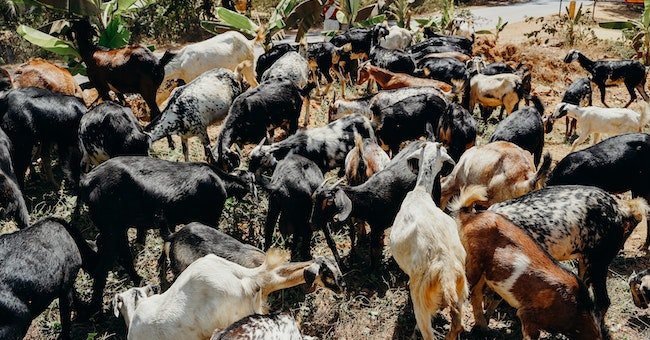
Feeding goats food from dogs could cause nutritional deficiencies. Goats have distinct nutritional needs from dogs, and their digestive systems aren’t designed to efficiently process dog food. Dog food isn’t designed to provide the required balance of nutrients that goats require to flourish.
For instance, goats require more fiber in their diets when compared to dogs. Insufficient fiber can result in digestive issues and poor gut health, as well as issues like constipation and bloating. Also, goats require certain vitamins and minerals that may not be found in the food for dogs.
Can Goats Digest Dog Food?
Goats are very adaptable in their diet and consume diverse foods, including grains, plants, and hay. However, when it comes to dog food, they may be unable to digest it because of the different characteristics of their digestive systems and nutritional requirements.
Differences in Digestive Systems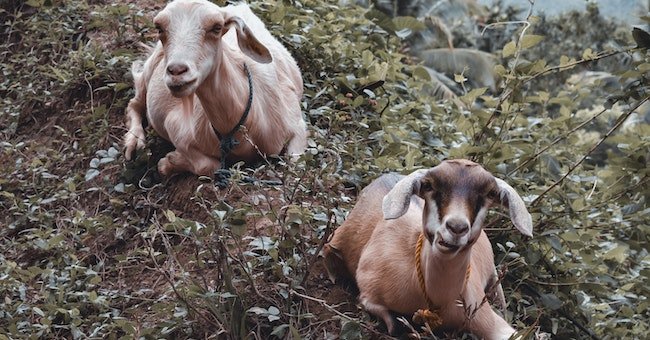
Goats have a distinctive digestive system that was designed to degrade plant fibers. Goats’ stomachs are divided into four compartments, including the rumen, the reticulum, the omasum, and the abomasum. Rumen is the largest compartment and houses microorganisms that degrade plant fibers and transform them into nutrients that goats can take in.
Dog food, however, is a great source of animal protein and fats and is not easily digestible by goats. Although goats can digest some animal proteins, they need a mostly plant-based diet to ensure their best health. Foods for dogs can cause digestive issues like diarrhea, bloating, and constipation.
For instance, if the goat were to eat most dog food, the protein content could impede the microorganisms living in the rumen, creating an imbalance of microflora and digestive issues.
Nutritional Requirements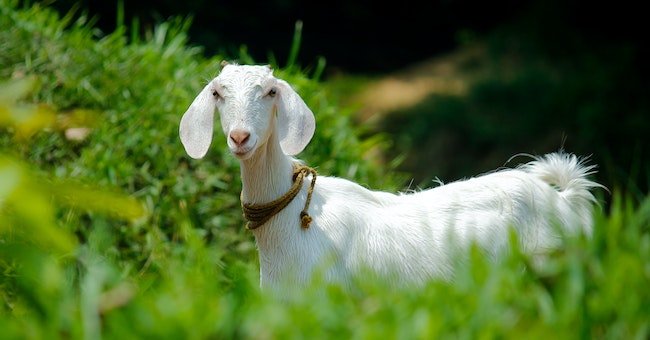
Goats have distinct nutritional needs compared to dogs. They require a high-fiber diet to aid digestion and ensure the rumen functions properly. Feeding them a diet low in fiber could cause problems with digestion and poor gut health.
Additionally, goats require certain vitamins and minerals that might not be found in pet food. For instance, goats need copper in their diets to maintain their health. Dog food is usually low in copper, and feeding it to goats may lead to a copper deficiency, leading to various health issues.
For instance, if goats ate primarily dog food, they could suffer from a copper deficiency that could lead to anemia, a slow growth rate, and a weak immune system.
Risks of Overfeeding
Feeding goats with dog food can result in overfeeding because dog food is usually packed with calories and fat. In excess, goats can develop obesity, leading to various health issues that include joint pain, heart disease, and reproductive problems.
For instance, if goats were to eat the majority of dog food for a long time, they could become obese or overweight, which can cause joint lameness and pain and heart disease, as well as reproductive issues like difficulty giving birth.
Overall Health 
Giving goats a balanced and nutritious diet ensures their overall well-being and health. While goats are famous for being able to consume a variety of different foods, it is essential to ensure their diet is well-balanced and supplies the required nutrients.
For instance, giving goats a diet high in roughage, such as pasture and hay, complemented by minerals and grains, can help ensure they receive an adequate diet. Giving them access to clean water and monitoring their weight could aid in ensuring that they are healthy.
How Much Dog Food Can Goats Eat?
Feeding your goats’ dogs food isn’t the best option since their digestion systems and nutritional requirements differ significantly from those of dogs. If you feed your goat’s dog food, knowing the amount they can consume safely is crucial. Here are some things to take into consideration when determining how goats can eat dog food:
Consider the Nutritional Content
Before feeding your goat’s dog food, it’s crucial to consider the nutritional contents. Dog food is generally packed with fat and protein, which can be difficult to digest for goats in large amounts. Additionally, dog food might be deficient in vital nutrients that goats require to maintain their health.
It is recommended that you provide your goats with a diet mostly of pasture or hay supplemented with minerals and grains. Feeding them small amounts of dog food to treat them or as a supplement is fine; however, it should not be the main food source for their diet.
Monitor Their Intake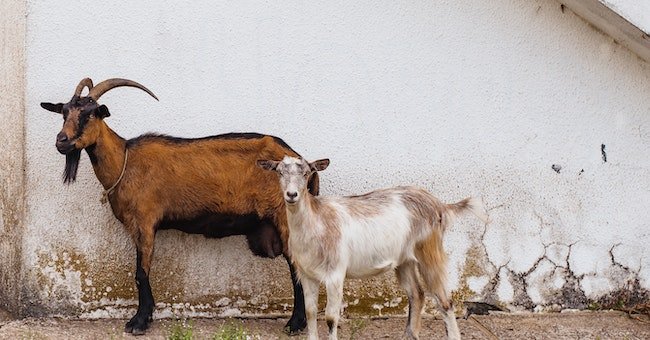
When feeding your dog goat foods, it’s crucial to keep track of their intake to ensure they’re not eating too much. Overfeeding can cause weight gain and other health issues. It is advised to restrict the dog food your goats eat to no less than 5–10% of their total diet.
For instance, if you are a farmer weighing 100 pounds, your goat should eat no more than 5–10 pounds of dog food weekly. It is essential to break the portion into smaller pieces so they don’t eat too many.
Watch for Digestive Issues
Feeding your goats too much dog food could cause digestive issues like diarrhea, bloating, and constipation. Observing one of these issues in your goats could indicate that they are taking in excessive amounts of dog food.
You must ensure your goats can access fresh water and eat an adequate diet that meets their nutritional requirements. If you aren’t sure whether your goats are getting the right nutrition, it is suggested that you consult an expert in animal care or a vet to ensure they are getting an adequate diet.
Feed A Variety Of Foods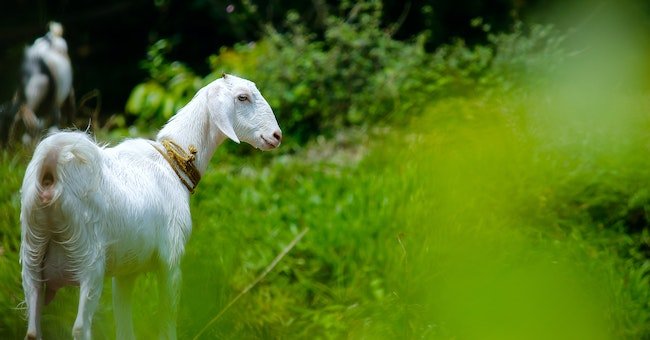
Although it might be tempting to feed your dog goat food as an indulgence, it is important to remember that they require a variety of diets to maintain their optimal health. Offering them a variety of foods like grains, hay, fruits, vegetables, and even fruit will help ensure that they get the essential nutrients.
For instance, giving your goats a mixture of hay, grains, and other vegetables like cabbage and carrots will give them a balanced diet that will meet their nutritional requirements. This will also help keep them from getting bored with their diet and encourage them to consume diverse foods.
Feeding Dog Food To Goats: Dos And Don’ts
Feeding goats dog food is a topic that has been a source of controversy for livestock owners. Though goats have been observed to eat dog food without any immediate adverse effects, it’s important to be aware of this method’s potential risks and advantages.
Do Consider Nutritional Content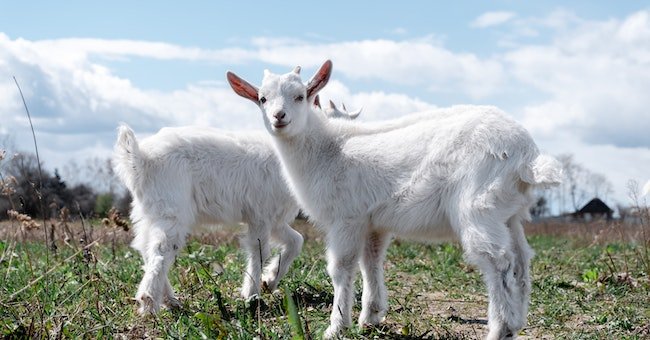
When feeding goats dog food, it is crucial to consider the feed’s nutritional content. Dog food is typically packed with fat and protein, which can be difficult to digest when consumed in large amounts. In addition, dog food might not contain all the nutrients that goats require for optimal health.
Before feeding goats dog food, it is recommended that you consult a vet or livestock nutritionist to make sure that the food you feed your goats is safe and suitable for them. They can also advise on how much dog food can be given to goats to avoid digestive issues and promote optimal health.
Don’t Use Dog Food As A Primary Feed Source
While dog food can be appropriate as a treat or a source of nutrition, it shouldn’t be the primary food source for goats. Goats have special nutritional needs and need a diet that is mostly pasture or hay, supplemented by minerals and grains.
Feeding your goats too much dog food could cause digestive issues like diarrhea, bloating, and constipation. It could also result in an unbalanced diet that may not meet the nutritional requirements of your goats.
DO Monitor Your Goats’ Intake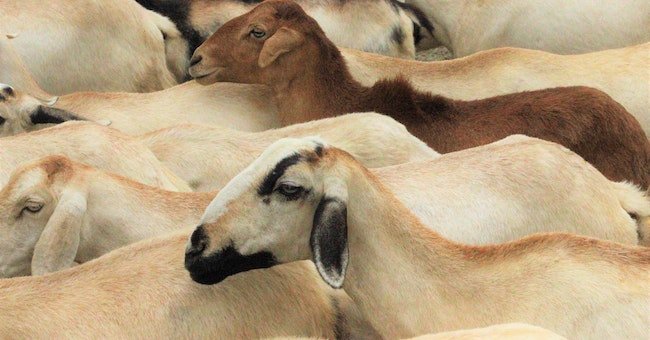
When feeding your dog goat foods, keeping track of their intake is essential to ensuring they aren’t eating too much. Overfeeding can cause obesity and other health issues.
It is suggested that you restrict the amount of dog food your goats eat to no less than 5–10% of their diet. For instance, if you have goats that weigh 100 pounds, they should eat less than 5–10 pounds of dog food each week. Breaking the quantity into smaller portions is essential to ensuring they don’t consume too many.
Don’t Feed Poor-Quality Dog Food
If you decide to feed goats and dogs food, selecting a high-quality product with a balanced mix of nutrients is crucial. Feeding poor-quality dog food can cause health issues such as digestive problems, nutrient deficiencies, and slow growth rates.
Before feeding goats and dogs food, ensure that you review the label and look at the ingredients list to ensure that the food is a healthy mixture of protein, fat, and other essential nutrients. It is also essential to properly store dog food to avoid spoilage and ensure that it is fresh and safe to consume.
Case Studies Experiences Of Goat Owners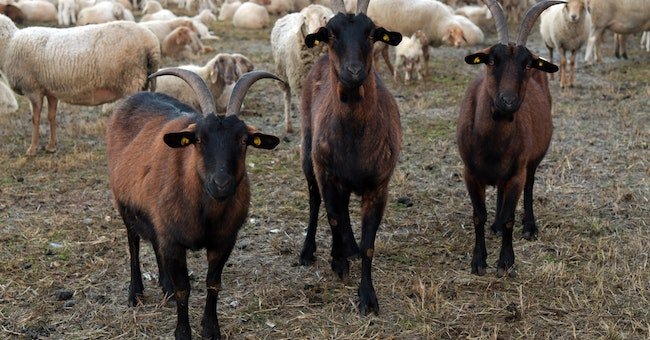
When it is time to feed goats food from dogs, goat owners’ experiences differ greatly. Here are a few instances of goat owners who have tried feeding dogs food to their goats.
Positive Experience
One goat owner from rural Texas said she had a good experience feeding the food of dogs to her animals. She had some bags of dog food left from her dogs and decided to test feeding her goats the food as a supplementary food source.
Initially, she was a bit cautious and gave her goats small amounts of pet food. She also closely monitored their health to ensure they did not have digestive issues. She increased the quantity of dog food she fed her goats and discovered that they could take it in without issue.
She said that the food for dogs seemed to have a positive effect on the overall health of her goats because they seemed to be more energetic. However, she also highlighted that using top-quality dog food and observing intake are important to avoid overfeeding.
Negative Experience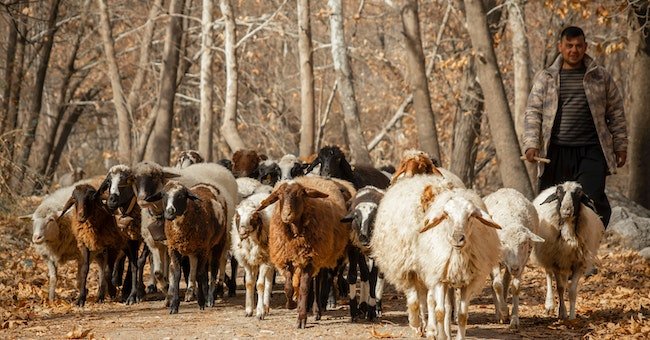
A goat owner in California experienced a negative experience feeding the goats dog food. She had read about the possible benefits of feeding dogs food to goats and decided to test it out.
After a few days of feeding goats and dogs food, she observed that they were suffering from digestive issues such as diarrhea and bloating. She also observed that they weren’t so active and seemed to be experiencing discomfort.
She stopped feeding them dog food and also consulted with her vet. The goats in her flock were found to have a mild case of colic, likely due to the abrupt changes in their diet. She learned that it is essential to introduce new food items gradually and to monitor your goat’s health closely.
Neutral Experience
A goat owner from Oregon experienced a mixed experience feeding dogs to her animals. She had a few bags of premium dog food left over from her dogs and decided to experiment with feeding her goats the food as an additional source of nutrition.
The dog food was introduced slowly, beginning with small amounts and gradually increasing in size over time. She also closely watched her goat’s health and observed no immediate adverse effects.
However, she didn’t notice any significant improvement in the health of her goats or their energy levels. She also observed that her goats preferred their usual feed over dog food and frequently kept the food for dogs unattended.
FAQ’s
Do goats eat dog or cat food?
Because both dog and cat food contain meat byproducts or components, you should never feed your goats either because doing so would cause internal harm to your animals.
How do I get my goat to quit consuming dog food?
You must allow your dog access to the feeder but bar the sheep and goats. The procedure is very straightforward: construct a robust fence around the feeder and cut a hole in it that is just big enough for your dog but too high and little for a lamb or goat to jump through.
What must you never give goats?
However, goats shouldn’t eat foods like garlic, onions, chocolate, or anything that contains caffeine, to mention a few, much like other animals. Goats shouldn’t be given leftover meat leftovers even though the majority of goats wouldn’t consume them. Additionally, citrus foods should be avoided because they seriously disturb the rumen.
Is it okay to combine goat milk and dog food?
Greater Hydration: Goat milk is a fantastic source of water, much like bone broth is! Goat milk can be added to raw food or to dry food to make it more hydrating because dogs enjoy gulping it down. Enhanced Appetite: Adding goat milk to your diet will help if you have a finicky eater in the house!
What food do goats prefer?
Roughage is the primary food source for goats. Grass or hay that is typically considered roughage is typically high in fibre and has little calories. Goats are built to consume a lot of hay because it has few calories.
What food is best for goats?
For goat rationing, common sources of protein include forages, hays, pellets (alfalfa), barley, peas (screenings, whole, split), corn, oats, distilled grains and meals (soybean, canola, cottonseed meals).
Can Goats Eat Dog Food?
Urolithiasis, or stones in the urinary tract, can result from feeding goat or dog food. This is due to mineral imbalances in goats brought on by the grain components in dog food. This can clog the urinary tracts of male animals, which is a serious issue. Complete urinary obstruction could happen if a goat consumes dog food for a prolonged period of time.
Goats’ digestive systems were not created to consume dog food effectively since they have different nutritional requirements than dogs.
Nutritional Needs Of Goats
Herbivores require a balanced diet, which comprises roughage, grains, and minerals, to fulfill their nutritional requirements. Giving goats a balanced diet is vital to their well-being and productivity.
Roughage
Roughage is an essential ingredient in a goat’s diet because it is a source of vital fiber that aids digestion and helps keep the rumen working correctly. Good sources of roughage for goats include pasture, hay, and browse.
Hay is the most commonly used source of roughage available to goats and should be of high quality, free of mold, and include a mix of grasses and legumes. Based on the weight and age of the goat, it is suggested that they consume 24 percent of their body weight in hay daily.
Browse and pasture are significant sources of roughage for goats because they supply a wide range of nutrients and keep them mentally active. Goats must have access to fresh pastures and browse daily, and the area must be rotated regularly to avoid overgrazing.
Grains
Apart from roughage, goats need grains to satisfy their protein and energy needs. The most commonly used grains for goat food include oats, corn, and barley. Goats have an extremely high need for energy, and these grains supply the energy required to keep them healthy and active. However, it is essential to eat grains in moderation since excessive feeding can cause digestive issues and make you overweight.
Protein is also vital for goats; grains are a great source of this essential nutrient. Goats require 16–18 percent protein in their diets, and grains can supply up to 12 percent protein. Adding protein to grains from a source like alfalfa pellets or soybean meal can aid in meeting the protein needs of goats.
Minerals
In addition, goats require a wide range of minerals to ensure good health and increase productivity. Essential minerals include calcium, magnesium, phosphorus, and copper. The minerals are found via supplements or a salt block. Mineral deficiencies can cause health issues, including slow growth, reduced production, and weakening immune systems.
It is crucial to remember that the nutritional requirements of goats may differ depending on their weight, age, and status in production. Lactating and pregnant goats have higher energy and protein needs, and their diets must be altered in line with their needs. Goats also require fresh water throughout the day to ensure good health.
Risks Of Feeding Dog Food To Goats
Feeding goats dog food could seriously harm their health and well-being. While goats can eat diverse foods such as hay, plants, and grains, dog food isn’t their best food source.
Digestive Issues
Goats have an exclusive digestive system specifically designed to digest plant fibers. Dog food is rich in animal proteins and fats, which are difficult to digest for goats. A diet unsuitable for goats’ digestion could cause digestive issues such as diarrhea, bloating, and constipation.
In addition, dog food frequently includes preservatives and other additives, which can irritate the goat’s digestive system and lead to further digestive issues. Goats require a diet high in fiber for digestion to ensure that the rumen functions correctly.
Nutritional Deficiencies
Feeding goats food from dogs could cause nutritional deficiencies. Goats have distinct nutritional needs from dogs, and their digestive systems aren’t designed to efficiently process dog food. Dog food isn’t designed to provide the required balance of nutrients that goats require to flourish.
For instance, goats require more fiber in their diets when compared to dogs. Insufficient fiber can result in digestive issues and poor gut health, as well as issues like constipation and bloating. Also, goats require certain vitamins and minerals that may not be found in the food for dogs.
Can Goats Digest Dog Food?
Goats are very adaptable in their diet and consume diverse foods, including grains, plants, and hay. However, when it comes to dog food, they may be unable to digest it because of the different characteristics of their digestive systems and nutritional requirements.
Differences in Digestive Systems
Goats have a distinctive digestive system that was designed to degrade plant fibers. Goats’ stomachs are divided into four compartments, including the rumen, the reticulum, the omasum, and the abomasum. Rumen is the largest compartment and houses microorganisms that degrade plant fibers and transform them into nutrients that goats can take in.
Dog food, however, is a great source of animal protein and fats and is not easily digestible by goats. Although goats can digest some animal proteins, they need a mostly plant-based diet to ensure their best health. Foods for dogs can cause digestive issues like diarrhea, bloating, and constipation.
For instance, if the goat were to eat most dog food, the protein content could impede the microorganisms living in the rumen, creating an imbalance of microflora and digestive issues.
Nutritional Requirements
Goats have distinct nutritional needs compared to dogs. They require a high-fiber diet to aid digestion and ensure the rumen functions properly. Feeding them a diet low in fiber could cause problems with digestion and poor gut health.
Additionally, goats require certain vitamins and minerals that might not be found in pet food. For instance, goats need copper in their diets to maintain their health. Dog food is usually low in copper, and feeding it to goats may lead to a copper deficiency, leading to various health issues.
For instance, if goats ate primarily dog food, they could suffer from a copper deficiency that could lead to anemia, a slow growth rate, and a weak immune system.
Risks of Overfeeding
Feeding goats with dog food can result in overfeeding because dog food is usually packed with calories and fat. In excess, goats can develop obesity, leading to various health issues that include joint pain, heart disease, and reproductive problems.
For instance, if goats were to eat the majority of dog food for a long time, they could become obese or overweight, which can cause joint lameness and pain and heart disease, as well as reproductive issues like difficulty giving birth.
Overall Health 
Giving goats a balanced and nutritious diet ensures their overall well-being and health. While goats are famous for being able to consume a variety of different foods, it is essential to ensure their diet is well-balanced and supplies the required nutrients.
For instance, giving goats a diet high in roughage, such as pasture and hay, complemented by minerals and grains, can help ensure they receive an adequate diet. Giving them access to clean water and monitoring their weight could aid in ensuring that they are healthy.
How Much Dog Food Can Goats Eat?
Feeding your goats’ dogs food isn’t the best option since their digestion systems and nutritional requirements differ significantly from those of dogs. If you feed your goat’s dog food, knowing the amount they can consume safely is crucial. Here are some things to take into consideration when determining how goats can eat dog food:
Consider the Nutritional Content
Before feeding your goat’s dog food, it’s crucial to consider the nutritional contents. Dog food is generally packed with fat and protein, which can be difficult to digest for goats in large amounts. Additionally, dog food might be deficient in vital nutrients that goats require to maintain their health.
It is recommended that you provide your goats with a diet mostly of pasture or hay supplemented with minerals and grains. Feeding them small amounts of dog food to treat them or as a supplement is fine; however, it should not be the main food source for their diet.
Monitor Their Intake
When feeding your dog goat foods, it’s crucial to keep track of their intake to ensure they’re not eating too much. Overfeeding can cause weight gain and other health issues. It is advised to restrict the dog food your goats eat to no less than 5–10% of their total diet.
For instance, if you are a farmer weighing 100 pounds, your goat should eat no more than 5–10 pounds of dog food weekly. It is essential to break the portion into smaller pieces so they don’t eat too many.
Watch for Digestive Issues
Feeding your goats too much dog food could cause digestive issues like diarrhea, bloating, and constipation. Observing one of these issues in your goats could indicate that they are taking in excessive amounts of dog food.
You must ensure your goats can access fresh water and eat an adequate diet that meets their nutritional requirements. If you aren’t sure whether your goats are getting the right nutrition, it is suggested that you consult an expert in animal care or a vet to ensure they are getting an adequate diet.
Feed A Variety Of Foods
Although it might be tempting to feed your dog goat food as an indulgence, it is important to remember that they require a variety of diets to maintain their optimal health. Offering them a variety of foods like grains, hay, fruits, vegetables, and even fruit will help ensure that they get the essential nutrients.
For instance, giving your goats a mixture of hay, grains, and other vegetables like cabbage and carrots will give them a balanced diet that will meet their nutritional requirements. This will also help keep them from getting bored with their diet and encourage them to consume diverse foods.
Feeding Dog Food To Goats: Dos And Don’ts
Feeding goats dog food is a topic that has been a source of controversy for livestock owners. Though goats have been observed to eat dog food without any immediate adverse effects, it’s important to be aware of this method’s potential risks and advantages.
Do Consider Nutritional Content
When feeding goats dog food, it is crucial to consider the feed’s nutritional content. Dog food is typically packed with fat and protein, which can be difficult to digest when consumed in large amounts. In addition, dog food might not contain all the nutrients that goats require for optimal health.
Before feeding goats dog food, it is recommended that you consult a vet or livestock nutritionist to make sure that the food you feed your goats is safe and suitable for them. They can also advise on how much dog food can be given to goats to avoid digestive issues and promote optimal health.
Don’t Use Dog Food As A Primary Feed Source
While dog food can be appropriate as a treat or a source of nutrition, it shouldn’t be the primary food source for goats. Goats have special nutritional needs and need a diet that is mostly pasture or hay, supplemented by minerals and grains.
Feeding your goats too much dog food could cause digestive issues like diarrhea, bloating, and constipation. It could also result in an unbalanced diet that may not meet the nutritional requirements of your goats.
DO Monitor Your Goats’ Intake
When feeding your dog goat foods, keeping track of their intake is essential to ensuring they aren’t eating too much. Overfeeding can cause obesity and other health issues.
It is suggested that you restrict the amount of dog food your goats eat to no less than 5–10% of their diet. For instance, if you have goats that weigh 100 pounds, they should eat less than 5–10 pounds of dog food each week. Breaking the quantity into smaller portions is essential to ensuring they don’t consume too many.
Don’t Feed Poor-Quality Dog Food
If you decide to feed goats and dogs food, selecting a high-quality product with a balanced mix of nutrients is crucial. Feeding poor-quality dog food can cause health issues such as digestive problems, nutrient deficiencies, and slow growth rates.
Before feeding goats and dogs food, ensure that you review the label and look at the ingredients list to ensure that the food is a healthy mixture of protein, fat, and other essential nutrients. It is also essential to properly store dog food to avoid spoilage and ensure that it is fresh and safe to consume.
Case Studies Experiences Of Goat Owners
When it is time to feed goats food from dogs, goat owners’ experiences differ greatly. Here are a few instances of goat owners who have tried feeding dogs food to their goats.
Positive Experience
One goat owner from rural Texas said she had a good experience feeding the food of dogs to her animals. She had some bags of dog food left from her dogs and decided to test feeding her goats the food as a supplementary food source.
Initially, she was a bit cautious and gave her goats small amounts of pet food. She also closely monitored their health to ensure they did not have digestive issues. She increased the quantity of dog food she fed her goats and discovered that they could take it in without issue.
She said that the food for dogs seemed to have a positive effect on the overall health of her goats because they seemed to be more energetic. However, she also highlighted that using top-quality dog food and observing intake are important to avoid overfeeding.
Negative Experience
A goat owner in California experienced a negative experience feeding the goats dog food. She had read about the possible benefits of feeding dogs food to goats and decided to test it out.
After a few days of feeding goats and dogs food, she observed that they were suffering from digestive issues such as diarrhea and bloating. She also observed that they weren’t so active and seemed to be experiencing discomfort.
She stopped feeding them dog food and also consulted with her vet. The goats in her flock were found to have a mild case of colic, likely due to the abrupt changes in their diet. She learned that it is essential to introduce new food items gradually and to monitor your goat’s health closely.
Neutral Experience
A goat owner from Oregon experienced a mixed experience feeding dogs to her animals. She had a few bags of premium dog food left over from her dogs and decided to experiment with feeding her goats the food as an additional source of nutrition.
The dog food was introduced slowly, beginning with small amounts and gradually increasing in size over time. She also closely watched her goat’s health and observed no immediate adverse effects.
However, she didn’t notice any significant improvement in the health of her goats or their energy levels. She also observed that her goats preferred their usual feed over dog food and frequently kept the food for dogs unattended.
FAQ’s
Do goats eat dog or cat food?
Because both dog and cat food contain meat byproducts or components, you should never feed your goats either because doing so would cause internal harm to your animals.
How do I get my goat to quit consuming dog food?
You must allow your dog access to the feeder but bar the sheep and goats. The procedure is very straightforward: construct a robust fence around the feeder and cut a hole in it that is just big enough for your dog but too high and little for a lamb or goat to jump through.
What must you never give goats?
However, goats shouldn’t eat foods like garlic, onions, chocolate, or anything that contains caffeine, to mention a few, much like other animals. Goats shouldn’t be given leftover meat leftovers even though the majority of goats wouldn’t consume them. Additionally, citrus foods should be avoided because they seriously disturb the rumen.
Is it okay to combine goat milk and dog food?
Greater Hydration: Goat milk is a fantastic source of water, much like bone broth is! Goat milk can be added to raw food or to dry food to make it more hydrating because dogs enjoy gulping it down. Enhanced Appetite: Adding goat milk to your diet will help if you have a finicky eater in the house!
What food do goats prefer?
Roughage is the primary food source for goats. Grass or hay that is typically considered roughage is typically high in fibre and has little calories. Goats are built to consume a lot of hay because it has few calories.
What food is best for goats?
For goat rationing, common sources of protein include forages, hays, pellets (alfalfa), barley, peas (screenings, whole, split), corn, oats, distilled grains and meals (soybean, canola, cottonseed meals).















